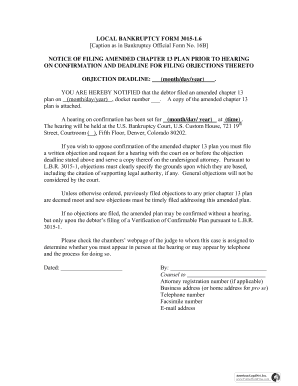Paperwork Checklist for Filing Chapter 13 Bankruptcy

Chapter 13 bankruptcy, often referred to as a wage earner's plan, allows individuals with regular income to restructure their debts and create a repayment plan that typically spans 3 to 5 years. This alternative to Chapter 7 bankruptcy involves more paperwork and meticulous planning, but it can save individuals from liquidation of assets and offer a fresh start. This guide will walk you through the comprehensive paperwork checklist required for filing Chapter 13 bankruptcy.
Initial Considerations Before Filing

Before delving into the paperwork specifics, consider the following:
- Eligibility: Ensure you meet the criteria for Chapter 13, like having a regular income, unsecured debts less than $419,275, and secured debts under $1,257,850.
- Credit Counseling: Complete a credit counseling course from an approved agency within 180 days before filing.
- Debtor Education: After filing, complete a debtor education course to have your bankruptcy discharged.
Required Documents for Filing

Here’s the essential paperwork you’ll need:
| Document Type | Description | Notes |
|---|---|---|
| Voluntary Petition (Form B101) | This initiates your bankruptcy filing. | Include any joint filing with your spouse. |
| Schedules (A/B to J) | Detailed lists of your assets, liabilities, income, and expenses. | Schedule A/B lists your property; Schedule I & J focus on income and expenses. |
| Statement of Financial Affairs (Form 107) | Answers questions about your financial activities over the last few years. | |
| Means Test (Form B 122C-1 & B 122C-2) | Determines if your income allows Chapter 13 filing or if you qualify for Chapter 7. | Calculate disposable income to propose your repayment plan. |
| Repayment Plan (Form B 113) | A detailed plan outlining how you'll repay your creditors over time. | Must be approved by the court and creditors. |

📝 Note: Ensure all forms are filled accurately; errors can cause delays or even denial of your case.
Additional Documentation

Beyond the basic forms, these documents can also be helpful:
- Pay Stubs: From the last 60 days to demonstrate your income.
- Tax Returns: The last two years to validate your financial history.
- Bank Statements: From the last 6 months to show your financial transactions.
- List of Creditors: Including their addresses, the amount owed, and any collateral.
- Property Valuations: For real estate or valuable personal property.
- Vehicle Documents: Proof of ownership or lease agreements.
The Importance of Accuracy and Completeness

The accuracy and completeness of your paperwork play a crucial role in the success of your bankruptcy filing:
- Review Carefully: Double-check all forms for correctness.
- Organize: Ensure documents are sorted for easy retrieval.
- Honesty: Bankruptcy fraud, including omission of assets or income, is a serious offense.
🚨 Note: Failing to include all required information can lead to dismissal of your bankruptcy case by the court.
Filing and Post-Filing Steps

Once you've gathered and filled out all necessary paperwork, proceed with:
- Filing: Submit the documents to the bankruptcy court.
- 341 Meeting: Attend the creditors’ meeting where you'll affirm your filing under oath.
- Plan Confirmation: Attend court hearings where your repayment plan is confirmed.
Wrapping Up

In the process of filing for Chapter 13 bankruptcy, the paperwork phase is not just about collecting documents; it's about setting the foundation for a successful repayment plan. By understanding what's required, preparing thoroughly, and being meticulous in your approach, you can navigate this complex legal terrain with greater confidence. Your journey towards financial recovery starts with accurate and complete paperwork, enabling you to take control of your financial future effectively.
What is the difference between Chapter 7 and Chapter 13 bankruptcy?

+
Chapter 7 involves liquidation of assets to pay off debts, offering a quick discharge of remaining debts. Chapter 13, on the other hand, creates a repayment plan for your debts over time, allowing you to keep your property while repaying your creditors.
Can I file for Chapter 13 bankruptcy without a lawyer?

+
Yes, it’s possible to file without a lawyer, but due to the complexity, legal counsel can help navigate the process more efficiently, potentially saving you time and avoiding costly mistakes.
How long does a Chapter 13 bankruptcy stay on your credit report?

+
Chapter 13 bankruptcy typically remains on your credit report for 7 years from the date of filing.
What happens if I miss a payment under my Chapter 13 plan?

+
Missing a payment can lead to the dismissal of your Chapter 13 case, or in some instances, the court might allow you to catch up on missed payments with additional conditions.
Is it possible to modify my Chapter 13 repayment plan?

+
Yes, if your financial situation changes significantly, you can request a modification of your repayment plan through the court.



